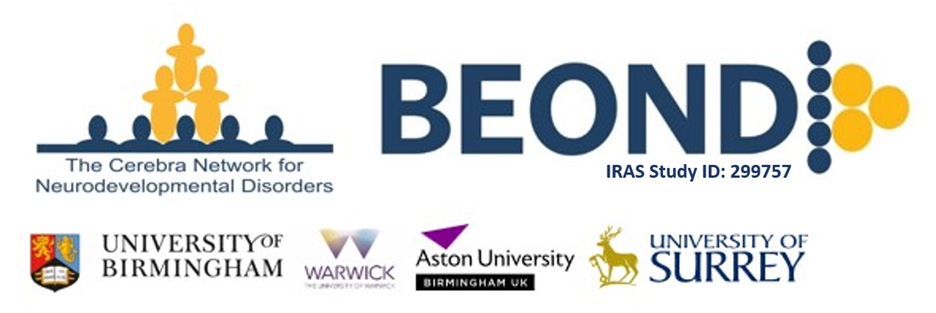The Cerebra Network for Neurodevelopmental Disorders is conducting a survey to learn more about behaviour, social functioning, sleep, hyperactivity, mood, physical and mental health, as well as family functioning and wellbeing, and how these change over time.

About the Study
Who can participate?
Parents and guardians/carers of a child (at least 1 year old) or an adult with full mutation Fragile X syndrome (FXS) may be eligible to participate.
What will happen in the study?
If the individual qualifies and decides to be in this research study, an invitation to complete the survey will be sent via email from a member of the Cerebra Network for Neurodevelopmental Disorders. The survey should take about 60 minutes to complete. The survey may be completed in more than one sitting.
What are the good things that can happen from this research?
We know that Fragile X syndrome, other genetic syndromes, neurodevelopmental disorders, and intellectual disabilities can affect people’s lives in lots of different ways. Our hope is that by collecting a range of data from lots of people with fragile X syndrome and other genetic syndromes at different points in their lives, we can develop a better understanding of common areas of difficulty, as well as challenges that might be specific to fragile X syndrome. Through this we may be able to offer better ideas for how to support people with Fragile X syndrome in the future.
Following participation in the survey, families will receive a feedback report to let them know about how their responses compare to other responses we have received and what the results might tell us about the person they care for.
What are the bad things that can happen from this research?
There is minimal risk anticipated for this study. The BEOND survey will touch on some quite sensitive topics, and families may be asked things that they do not often discuss with other people. For example, questions about behaviours that families might find challenging, or questions about distress experienced by caregivers. We invite any participants or family members to contact the research team if they find anything in the survey upsetting.
There may be other risks that we do not know about yet.
Will I or my child be paid to complete this study?
Participation in the BEOND study will be rewarded by entry into a prize draw. To qualify for entry into the prize draw, participants must have completed the survey in full. Prize draw entries will remain valid even if a family later chooses to withdraw from the study.
You can learn more about this study by visiting the study website: https://www.cerebranetwork.com/beond-fxs
Interested in Participating?
Our Most Recent Opportunities
Assessing Parental/Guardian Experiences with Genetic Counseling for Fragile X Syndrome
Molly Mizenko, a student researcher in Indiana University’s Genetic Counseling Graduate Program, is conducting a survey to explore the experiences of parents and guardians who have received genetic counseling following their child’s diagnosis of Fragile X syndrome.
Study: Examining Factors that Influence Expectations for Individuals with an Intellectual or Developmental Disability (IDD)
Dr. Grace Francis from George Mason University is conducting an online survey to explore factors that affect the expectations for individuals with intellectual or developmental disabilities (IDD), including Fragile X syndrome (FXS), after they finish school.
Study: Identifying Translational Sleep Biomarkers in Autism
The Manoach Lab at Massachusetts General Hospital is conducting a research study to explore brain activity during sleep and sensory processing in individuals living with Fragile X syndrome (FXS).
Single-Dose Study for Adult Men with FXS
Cincinnati Children's Hospital Medical Center is looking for males ages 18-40 with FXS to participate in a single-dose clinical trial that is studying a drug called Gaboxadol.
Study: Somatic symptom development in 6-12 year old females with an FMR1 mutation (SoS Study)
Researchers at the New York State Institute for Basic Research are conducting a study to better understand the development of physical (somatic) symptoms in females living with and without an FMR1 gene variation.
Study: Web Intervention for Parents of Youth with Genetic Syndromes (WINGS)
Researchers at the Autism Assessment, Research, Treatment & Services (AARTS) Center at Rush University Medical Center are currently conducting a fully-virtual research study that is testing two telehealth interventions that are designed to help parents of children with genetic syndromes and intellectual disabilities gain strategies to manage challenging behaviors.

